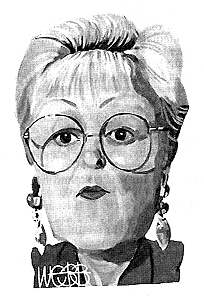
-
The Objections Letter
-
 We have a real concern that whatever criticism might properly, in the reviewer's
judgement, be leveled at the Department, the expression of them should not be such as to assume a
prejudicial life of their own, especially a life that may endure long after lessons have been learnt from
the present review. Put another way, the reviewer should not criticise the department in such a
way that the sting of the criticism is more than is warranted, so that it could never, or only with
extreme difficulty, be shaken off.
We have a real concern that whatever criticism might properly, in the reviewer's
judgement, be leveled at the Department, the expression of them should not be such as to assume a
prejudicial life of their own, especially a life that may endure long after lessons have been learnt from
the present review. Put another way, the reviewer should not criticise the department in such a
way that the sting of the criticism is more than is warranted, so that it could never, or only with
extreme difficulty, be shaken off.
- Paragraph 4.2. This paragraph states that "in Winz's case part of the difficulty has been
self-induced". What difficulty? How has that difficulty been self-induced? Reference to
"self-induced difficulty" is, so far as we can judge, unclear, inaccurate and prejudicial. We suggest
the phrase be deleted.
The paragraph also states that over the past l8 months mistakes have occurred. This makes the uncritical assumption that many mistakes have been made. What are these? Is it fair to judge all of these as mistakes, as opposed to development issues and complications that inevitably accompany major change?
- Paragraph 4.18. The final comment about
Winz being an organisation without a brain
is open to misinterpretation and is prejudicial. We suggest instead "... has reduced the
Department's strategic capacity below optimal levels."
Paragraph 6.3. The Department accepts that strong control has been exercised where appropriate, but denies that use of the term "authoritarian" is warranted or fair. Central control is necessary because of the requirements and outcomes expected of the organisation. In a sense Winz has a lot in common with all of the major delivery organisations in the public sector e.g Police, Customs and Inland Revenue rather than policy agencies. All other public sector delivery organisations have a top- down approach, and no one criticises them for that.
- A statement has been made that the requirement for speed has suppressed even
constructive criticism or alternative approaches, and has imposed solutions from Wellington. Can the
reviewer support this contention? Winz regards its approaches as dynamic, and subject to
continuous improvement.
- Paragraphs 9,5 and 9.6. There are significant and balanced backgrounds in the Winz management team, and we do not accept the assertion that the leadership team is without long Public Service experience. The average length of public service experience in the leadership team is 15 years. In addition, many of the leadership team members have been involved in the management of major organisational change.
- Corporate wardrobes, branding strategies and management retreats were features of
both Income Support and the Employment Service, as they are for most delivery agencies in the
public service. It is no surprise therefore that these initiatives were carried over into WINZ,
particularly when the previous Government supported them.
- Paragraph 9.7. It is stated that the imposition of a single, highly controlled, style and culture has produced its casualties. What are these casualties? Has this modus operandi produced any benefits? Can the reviewer point to any other merger examples of this scale where disparate organisations have been drawn together quickly without a high degree of direction from the centre?
- The paragraph also states that staff describe a "climate of fear" which regards criticism as negative or disloyal. We regard this term as highly prejudicial. There is an implication that all staff take this view. We know that is simply untrue. It appears that the comments of some staff have been taken to represent the view of all staff.
- Paragraph 9.11. We take a strong inference from this paragraph that the Chief Executive does not fit with a desired public servant profile i.e. she is not "grey and boring'. There is a further implied suggestion that she may be perceived to be politically aligned. This is highly contentious and prejudicial.
- Paragraph 15.7(ii) We have concerns about the Regional Commissioner
recommendations. The present recommendation implicitly criticises without foundation, the level of autonomy
and flexibility currently given to Regional Commissioners. Regional Commissioners have
significant autonomy to deliver and purchase a range of services to meet community needs.
We know that some Regional Commissioners believe they should have increased autonomy. At this point in the development of the organisation, we consider that to progress devolution of decision making at a faster rate presents significant risk to service delivery and the Crown (with respect to managing benefit requirements).
Source Letter to Don Hunn, Ministerial Review Team from Christine Rankin, Chief Executive of Winz, 27 April 2000

Top of Page
This Letter's Main Page
Stats | Subscribe | Index |
The Jobs Letter Home Page | The Website Home Page
jrt@jobsletter.org.nz
The Jobs Research Trust -- a not-for-profit Charitable Trust
constituted in 1994
We publish The Jobs Letter
from The Jobs Letter No.124 / 19 May 2000
Some extracts from CHRISTINE RANKIN's letter to reviewer Don Hunn ... later tabled in Parliament by State Services Minister Trevor Mallard.







